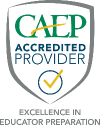What you will study
UCM’s Instructional Technology classes will help you build on your teaching skills
with experience using spreadsheets, presentation programs, word processing files,
databases and many other online learning technologies. You’ll also take a deep dive
into new technologies, enhancing your skills in areas such as designing game-based
learning activities and recording and editing audio and video.
Our minor in Instructional Technology also offers you training in professionalism
and ethical behavior for the workplace. Regardless of your career trajectory, this
well-rounded minor will prepare you with the practical skills you need to be a leader
in a variety of traditional or virtual learning environments.
Supplement your major program of study with classes such as:
- Technology and Society
- Integrating Technology Into Teaching
- Principles of Online Instruction
- Fund Development for Educational Technology
Excellence in Instructional Technology
- A Best Value College for Educational/Instructional Technology (College Factual, 2022)
Unique learning opportunities in instructional technology
At the University of Central Missouri, we know that hands-on experience in the classroom
is one of the best ways to sharpen your professional skills:
- Internship: As part of the online program for UCM’s minor in Instructional Technology,
you’ll complete at least one practicum in an onsite or virtual learning environment,
such as a school or library. Field experiences give you the chance to practice your
teaching methodologies and presentation skills using the latest instructional technologies.
You can complete the internship at the approved location of your choice, supported
throughout by your UCM faculty team.
What can you do with a minor in Instructional Technology from UCM?
UCM’s Instructional Technology minor prepares you to teach in any type of classroom,
whether in person or online, in an academic or professional setting. You won’t just
be teaching with the latest technologies — you’ll be ready to teach others about them.
Graduates from the University of Central Missouri who have completed the Instructional
Technology minor move on to exciting roles in areas such as:
- Teaching
- Instructional design
- Educational technology consulting
- Corporate training
- Military training
- Library educational services
UCM’s Instructional Technology minor will also better prepare you to pursue advanced
degrees in your major area of study or an education-focused field. Graduate schools
value applicants with a strong desire to improve their skills beyond their major curriculum
— especially when it comes to improving technological skills.
Jobs for Instructional Technology minors
Use our interactive tool below to learn more about salary potential, job outlooks
and other career information for graduates with experience in instructional technology,
education and teaching.
Financial assistance options for your Instructional Technology minor
The University of Central Missouri offers you a high-quality, affordable education.
In addition to our competitive tuition rates, our financial advisors will help you
figure out how to finance your college education and explore your options for grants, scholarships and loans. At UCM, we strive to
make our programs accessible for all students, and we’ve been recognized by LendEDU
for our high number of graduates with low student debt.
UCM offers general university scholarships that are open to incoming freshmen, transfer
students, continuing undergraduates and out-of-state students. Many of our programs
also offer financial awards exclusively for their students. Learn more about program-specific
scholarships for your major by using the UCM Scholarship Finder.
Meet Dr. Shantia Kerr Sims
Professor, Instructional Technology
Dr. Kerr Sims holds a Ph.D. in Curriculum and Instruction, with an emphasis in Learning
Technologies, from the University of Minnesota. Students benefit from her vast experience
with implementing technologies in education and her history of support for transfer
and first-generation students.
Meet Dr. Lauren Hays
Associate professor and Educational Technology program coordinator
Dr. Hays has degrees in Social Science and Library Science, as well as a Ph.D. in
Educational Leadership from Northwest Nazarene University. She teaches classes such
as Principles of Online Instruction for Instructional Technology minors. UCM students
benefit from her experience as an academic librarian and research in digital literacy,
educational development and information literacy.
leftright
|

Explore programs related to instructional technology.
If you’re interested in enhancing your major area of study with a different technology-
or education-focused minor, look into some of these other UCM programs:
|
Student Learning Outcomes
As a graduate with a minor in Instructional Technology, you will use the knowledge
and skills obtained in the program to:
- Demonstrate the ability to teach with and about technology at a distance
- Demonstrate the use of various forms of technology integration in the classroom environment,
including word-processing, databases, spreadsheets, educational applications, presentation
programs and the Internet
- Demonstrate the ability to teach with and about technology
- Apply appropriate theories and reflective models in instructional technology settings
- Exhibit professionalism and ethical behavior
- Provide leadership in the field of instructional technology
- Actively participate in the educational process by applying cutting-edge technologies
that infuse the most current and effective strategies into the learning process
- Develop capabilities for applying technologies as tools in the learning environments
and designing materials for the classroom
Course Sequencing
INST 4110: Google Educator Prep is a prerequisite for INST 4120: Google Education
Trainer Prep. INST 4920: Practicum in Instructional Technology should be taken following
other coursework for the minor. Other than that, you can take most courses in any
order. Contact your advisor for more information and advice.
Minor Requirements
We believe that hands-on experience is ideal. At the end of the program, you will
complete a practicum at a school of your choice in conjunction with your student teaching
or separately prior to this experience. This gives you the opportunity to tie together
everything you learned throughout your courses with local experts and real-life scenarios.

UCM is the longest continuously CAEP accredited public institution in Missouri














